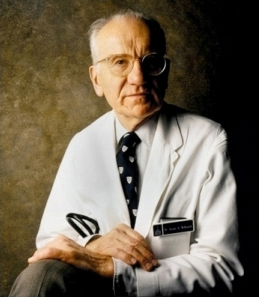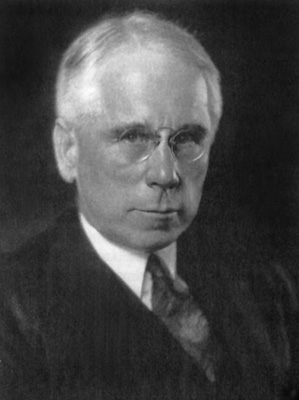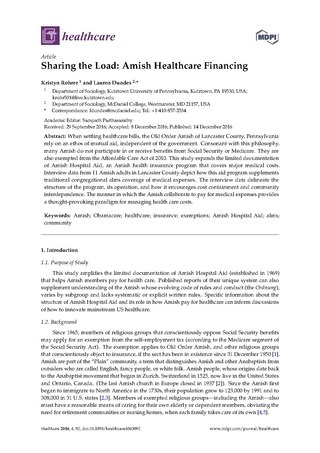Related Research Articles

Plain people are Christian groups characterized by separation from the world and by simple living, including plain dressing in modest clothing. Many Plain people have an Anabaptist background. These denominations are largely of German, Swiss German and Dutch ancestry, though people of diverse backgrounds have been incorporated into them. Conservative Friends are traditional Quakers who are also considered plain people; they come from a variety of different ethnic backgrounds.

Victor Almon McKusick was an American internist and medical geneticist, and Professor of Medicine at the Johns Hopkins Hospital, Baltimore. He was a proponent of the mapping of the human genome due to its use for studying congenital diseases. He is well known for his studies of the Amish. He was the original author and, until his death, remained chief editor of Mendelian Inheritance in Man (MIM) and its online counterpart Online Mendelian Inheritance in Man (OMIM). He is widely known as the "father of medical genetics".

Cleveland Clinic, founded in 1921 by a group of faculty and alumni from the Case Western Reserve University School of Medicine, is a nonprofit American academic medical center based in Cleveland, Ohio. Owned and operated by the Cleveland Clinic Foundation, an Ohio nonprofit corporation, it runs a 170-acre campus in Cleveland, as well as 11 affiliated hospitals, 19 family health centers in Northeast Ohio, and hospitals in Florida and Nevada. International operations include the Cleveland Clinic Abu Dhabi hospital in the United Arab Emirates and Cleveland Clinic Canada, which has two executive health and sports medicine clinics in Toronto. Another hospital campus in the United Kingdom, Cleveland Clinic London, opened to outpatients in 2021 and fully opened in 2022. Tomislav Mihaljevic is the president and CEO.

Morton Henry Prince was an American physician who specialized in neurology and abnormal psychology, and was a leading force in establishing psychology as a clinical and academic discipline.
Donald B. Kraybill is an American author, lecturer, and educator on Anabaptist faiths and culture. Kraybill is widely recognized for his studies on Anabaptist groups and in particular the Amish. He has researched and written extensively on Anabaptist culture. He is Distinguished Professor Emeritus at Elizabethtown College and Senior Fellow Emeritus at Elizabethtown's Young Center for Anabaptist and Pietist Studies.
The Clinic for Special Children (CSC) is a primary pediatric care and gene research clinic located in Strasburg, Pennsylvania. The facility specializes in genetic problems of the plain sects, such as the Amish and Old Order Mennonites. It was founded in 1989. The most common genetic disorders treated by the Clinic are glutaric acidemia type I (GA1), which is common in the Amish population and maple syrup urine disease (MSUD), which has a high prevalence in the Old Order Mennonites.

Lightner Witmer was an American psychologist. He introduced the term "clinical psychology" and is often credited with founding the field that it describes. Witmer created the world's first "psychological clinic" at the University of Pennsylvania in 1896, including the first journal of clinical psychology and the first clinical hospital school in 1907.

Akron Children's Hospital (ACH) is a pediatric acute care hospital in Northeast Ohio that provides care to infants, children, adolescents, young adults, aged 0–21 and even some older adults.
John A. Hostetler was an American author, educator, and scholar of Amish and Hutterite societies. Some of his works are still in print.

The Eastman Dental Hospital was based on Gray's Inn Road until it co-located with the University College London ear, nose, throat, balance and hearing services on Huntley Street, London, as the Royal National ENT and Eastman Dental Hospitals in October 2019. The hospital continues to provide specialist dental treatment as well as ear, nose, throat, hearing, speech and balance services and is part of the University College London Hospitals NHS Foundation Trust.

The Amish, formally the Old Order Amish, are a group of traditionalist Anabaptist Christian church fellowships with Swiss German and Alsatian origins. They are closely related to Mennonite churches, a separate Anabaptist denomination. The Amish are known for simple living, plain dress, Christian pacifism, and slowness to adopt many conveniences of modern technology, with a view neither to interrupt family time, nor replace face-to-face conversations whenever possible, and a view to maintain self-sufficiency. The Amish value rural life, manual labor, humility and Gelassenheit.

Amish believe large families are a blessing from God. Amish rules allow marrying only between members of the Amish Church. The elderly do not go to a retirement facility; they remain at home. As time has passed, the Amish have felt pressures from the modern world; their traditional rural way of life is becoming more different from the modern society. Isolated groups of Amish populations may have genetic disorders or other problems of closed communities. Amish make decisions about health, education, relationships based on their Biblical interpretation. Amish life has influenced some things in popular culture. As the Amish are divided into the Old Order Amish, New Order Amish, and Beachy Amish, the way of life of families depends on the rule of the church community to which they belong.

Donald Guthrie was an American surgeon, best known for establishing Guthrie Clinic in Sayre, Pennsylvania in 1910. One of nation's earliest multi-specialty group medical practices, Guthrie based the formation of the clinic that bears his name on the principles he learned while a surgical resident at Mayo Clinic, Rochester, Minnesota.
Lala Suraj Nandan Prasad (1914–2009) was an Indian pediatrician and a former professor of pediatrics of the Patna Medical College and Hospital whose efforts were reported behind the establishment of the department of pediatrics and the development of the children's ward into a 250 bedded Children's Hospital at the institution. He was the founder president of the Indian Academy of Pediatrics when the organization was formed in 1964 though the merger of erstwhile Indian Pediatric Society and the Association of Pediatricians of India. The Government of India awarded him the fourth highest Indian civilian award of Padma Shri in 1974.

Health among the Amish is characterized by higher incidences of particular genetic disorders, especially among the Old Order Amish. These disorders include dwarfism, Angelman syndrome, and various metabolic disorders, such as Tay-Sachs disease, as well as an unusual distribution of blood types.

Rosalie Slaughter Morton was an American physician, surgeon, and author. In addition to running her own medical practices, she became the first woman appointed as Attending Surgeon at the College of Physicians and Surgeons at Columbia University in 1916, and became the first chairperson of the American Women's Hospitals Service the following year. Morton served as a medic during the First World War, and was the first chair of the Public Health Education Committee. She was also one of the first women to join the faculty, and to later become a professor, at the Polyclinic Hospital of New York.

Ronald Charles MacKeith FRCP was a British paediatrician. MacKeith was prolific in his endeavours. He was principally known for establishing the first cerebral palsy advice clinic, which was to become in 1964, the larger and more comprehensive Newcomen Centre for disabled children in Guy's Hospital. He founded the British Paediatric Neurology Association and the medical journal, Developmental Medicine & Child Neurology. His work gained recognition of the field of paediatric neurology as a science in several European countries.
Pennsylvania State College of Medicine (PSCOM), known simply as Penn State College of Medicine is the medical school of Pennsylvania State University, a public university system in Pennsylvania. It is located in Hershey near the Penn State Milton S. Hershey Medical Center and Penn State Health Children's Hospital, the medical school's principal affiliate. The medical school includes 26 basic science and clinical departments and a range of clinical programs conducted at its hospital affiliates and numerous ambulatory care sites in the region.

Penn State Health Children's Hospital (PSCH) is a nationally ranked women's and pediatric acute care teaching hospital located in Hershey, Pennsylvania. The hospital has 134 pediatric beds. PSCH is affiliated with the Penn State College of Medicine and is located at the Milton S. Hershey Medical Center. The hospital provides comprehensive pediatric specialties and subspecialties to infants, children, teens, and young adults aged 0–21 throughout central Pennsylvania and surrounding regions. Penn State Health Children's Hospital also sometimes treats adults that require pediatric care. PSCH also maintains one of Pennsylvania's four Level 1 Pediatric Trauma Centers.
References
- ↑ "Trinity College alumni page for Dr Morton". Archived from the original on September 29, 2007. Retrieved December 5, 2006.